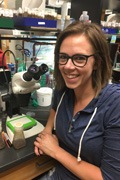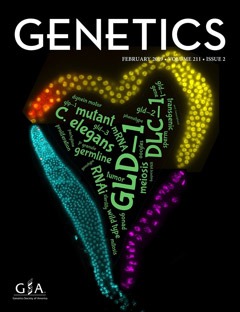Overview
The Elizabeth W. Jones Award for Excellence in Education recognizes individuals or groups who have had significant, sustained impact on genetics education at any level, from K-12 through graduate school and beyond. Recipients of this award will have promoted greater exposure to and deeper understanding of genetics through distinguished teaching or mentoring; development of innovative pedagogical approaches or tools; design of new courses or curricula; national leadership; and/or public engagement and outreach.
The award was named posthumously for Elizabeth W. Jones (1939–2008), who was the recipient of the first GSA Excellence in Education Award in 2007. She was a renowned geneticist and educator who served as the 1987 GSA President and as Editor-in-Chief of GSA’s journal GENETICS for nearly 12 years (1996-2008). Jones earned a bachelor’s degree in chemistry and the first PhD in genetics granted by the University of Washington. She completed postdoctoral training at the Massachusetts Institute of Technology and was on the faculty at Case Western Reserve University for five years before joining Carnegie Mellon in 1974.
At the time of her death, Jones was University Professor at Carnegie Mellon University, the institution’s highest faculty honor. She also served as head of the Department of Biological Sciences and Dr. Frederick A. Schwertz Distinguished Professor of Life Sciences. Her lab used genetic approaches to understand how proteins in yeast cells reach their proper destinations.
Nomination Process and Instructions
Full instructions on how to nominate for a GSA Award are available here.
A nomination packet should include:
- Nominee name and contact information
- Nominator name and contact information (if different from the nominee)
- Cover Letter (250 words or fewer)
- NIH-style biosketch (5 pages or fewer)
- Lived-experience statement (250 words or fewer) Nominees should give an overview of their career path and scientific philosophy in 250 words or fewer. They are encouraged to describe their particular approaches to research, mentoring, teaching, and equity, as appropriate, and are welcome to include information about barriers they have faced and/or overcome.
- Selection questionnaire (see below)
- Demographic survey (optional)
Eligibility
To be considered for the Elizabeth W. Jones Award for Excellence in Education, the nominee(s) need not be GSA member(s). However, nominees who are members of GSA will be given priority in the selection process. Individuals and teams can be nominated. There is no limit on the number of team members.
Selection Questionnaire
- Describe the nominee’s key contribution(s) to genetics education, including the level of learner targeted (K–12, college, graduate school, etc.). (100 words or fewer)
- Provide the approximate number and type of learners and the duration of the educational event(s) involved in the nominee’s key contribution. (E.g., 50 high-school educators; one 2-week, full-time event; held annually)
- How has the nominee’s contribution to genetics education led to deeper engagement with the community? (100 words or fewer)
- If nominating more than one individual, describe the synergy between the nominees that helped to generate the unique education climate. (100 words or fewer)
- Was the nominee involved in generating and deploying new curriculum? If so, describe the type of curriculum, the level of learner targeted, and the ways it has been disseminated. (100 words or fewer)
Important Dates
Nominations are due October 1, 2024.
Past Recipients
| 2025 | Jason Williams, Cold Springs Harbor Laboratory DNA Learning Center |
| 2024 | Build-a-Genome led by Jef Boeke, New York University |
| 2023 | No award given |
| 2022 | Alana O’Reilly and Dara Ruiz-Whalen, Fox Chase Cancer Center and eCLOSE Institute |
| 2021 | Edward J. Smith, Virginia Tech |
| 2020 | Seth Bordenstein, Vanderbilt University |
| 2019 | Bruce Weir, University of Washington in Seattle |
| 2018 | Steven Farber, Carnegie Institution for Science Jamie Shuda, University of Pennsylvania |
| 2017 | Sally G. Hoskins, City College of the City University of New York |
| 2016 | William Wood, University of Colorado |
| 2015 | Louisa A. Stark, University of Utah |
| 2014 | Robin Wright, University of Minnesota |
| 2013 | A. Malcolm Campbell, Davidson College |
| 2012 | David A. Micklos, Cold Spring Harbor Laboratory |
| 2011 | Peter J. Bruns, Howard Hughes Medical Institute (retired) |
| 2010 | Utpal Banerjee, University of California, Los Angeles |
| 2009 | Sarah C. R. Elgin, Washington University in St. Louis and Howard Hughes Medical Institute |
| 2008 | R. Scott Hawley, Stowers Institute for Medical Research |
| 2007 | Elizabeth W. Jones, Carnegie Mellon University |



